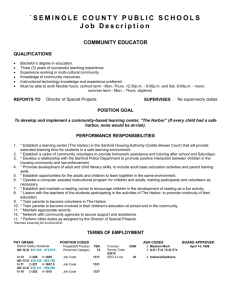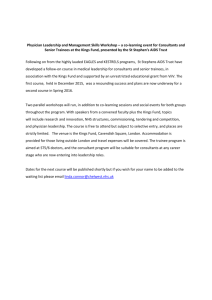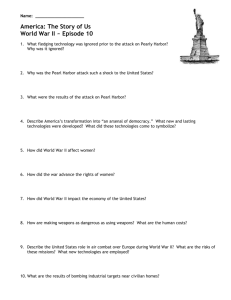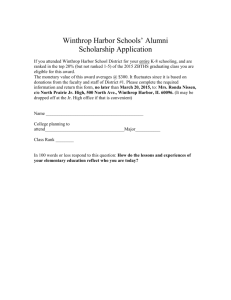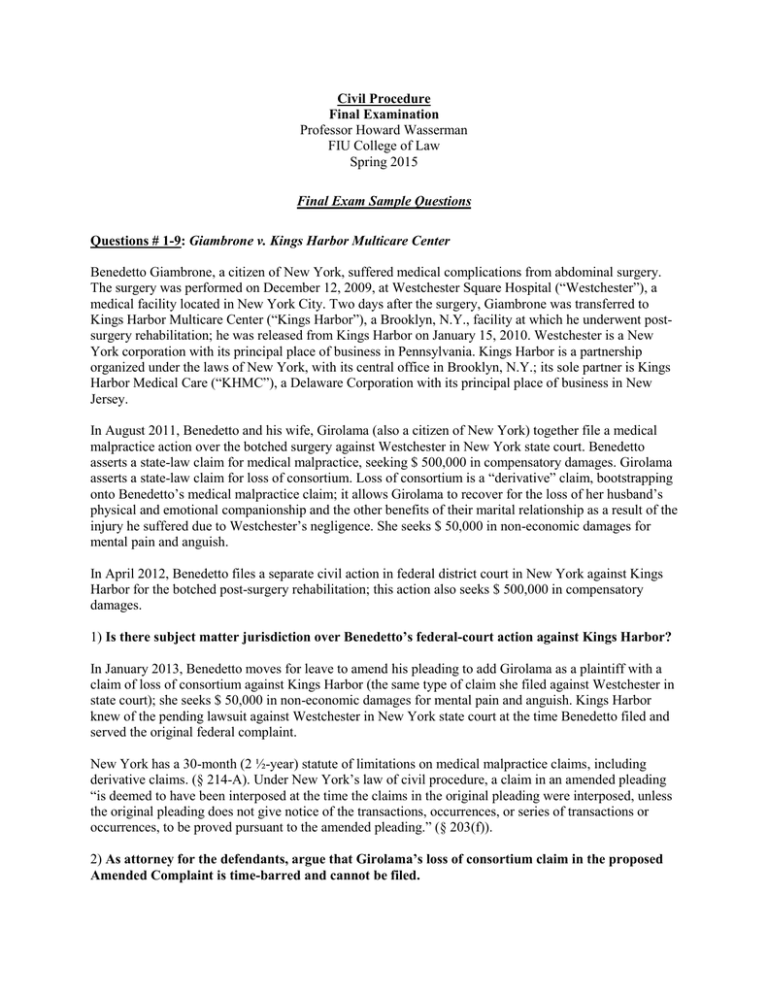
Civil Procedure
Final Examination
Professor Howard Wasserman
FIU College of Law
Spring 2015
Final Exam Sample Questions
Questions # 1-9: Giambrone v. Kings Harbor Multicare Center
Benedetto Giambrone, a citizen of New York, suffered medical complications from abdominal surgery.
The surgery was performed on December 12, 2009, at Westchester Square Hospital (“Westchester”), a
medical facility located in New York City. Two days after the surgery, Giambrone was transferred to
Kings Harbor Multicare Center (“Kings Harbor”), a Brooklyn, N.Y., facility at which he underwent postsurgery rehabilitation; he was released from Kings Harbor on January 15, 2010. Westchester is a New
York corporation with its principal place of business in Pennsylvania. Kings Harbor is a partnership
organized under the laws of New York, with its central office in Brooklyn, N.Y.; its sole partner is Kings
Harbor Medical Care (“KHMC”), a Delaware Corporation with its principal place of business in New
Jersey.
In August 2011, Benedetto and his wife, Girolama (also a citizen of New York) together file a medical
malpractice action over the botched surgery against Westchester in New York state court. Benedetto
asserts a state-law claim for medical malpractice, seeking $ 500,000 in compensatory damages. Girolama
asserts a state-law claim for loss of consortium. Loss of consortium is a “derivative” claim, bootstrapping
onto Benedetto’s medical malpractice claim; it allows Girolama to recover for the loss of her husband’s
physical and emotional companionship and the other benefits of their marital relationship as a result of the
injury he suffered due to Westchester’s negligence. She seeks $ 50,000 in non-economic damages for
mental pain and anguish.
In April 2012, Benedetto files a separate civil action in federal district court in New York against Kings
Harbor for the botched post-surgery rehabilitation; this action also seeks $ 500,000 in compensatory
damages.
1) Is there subject matter jurisdiction over Benedetto’s federal-court action against Kings Harbor?
In January 2013, Benedetto moves for leave to amend his pleading to add Girolama as a plaintiff with a
claim of loss of consortium against Kings Harbor (the same type of claim she filed against Westchester in
state court); she seeks $ 50,000 in non-economic damages for mental pain and anguish. Kings Harbor
knew of the pending lawsuit against Westchester in New York state court at the time Benedetto filed and
served the original federal complaint.
New York has a 30-month (2 ½-year) statute of limitations on medical malpractice claims, including
derivative claims. (§ 214-A). Under New York’s law of civil procedure, a claim in an amended pleading
“is deemed to have been interposed at the time the claims in the original pleading were interposed, unless
the original pleading does not give notice of the transactions, occurrences, or series of transactions or
occurrences, to be proved pursuant to the amended pleading.” (§ 203(f)).
2) As attorney for the defendants, argue that Girolama’s loss of consortium claim in the proposed
Amended Complaint is time-barred and cannot be filed.
3) What is the basis for subject matter jurisdiction over Girolama’s claim against Kings Harbor?
Does asserting jurisdiction over Girolama’s claim affect the court’s subject matter jurisdiction with
respect to Benedetto’s initial claim?
Kings Harbor wants to assert state law claims against Westchester in the federal court action; the claims
are for Indemnification (pursuant to a contract, Westchester patients are sent to Kings Harbor for postsurgery rehabilitation; that contract contains a provision requiring Westchester to indemnify Kings Harbor
for any claim brought against Kings Harbor based on surgeries performed at Westchester) and
Contribution (based on Westchester being liable (in some degree) for Benedetto’s injuries).
4) Under the Federal Rules, can Kings Harbor assert its claims against Westchester in this action?
5) What would be the best basis for subject matter jurisdiction over Kings Harbor’s claims against
Westchester?
6) If Kings Harbor brings Westchester into the federal action, can Benedetto now validly
(considering both the Federal Rules and jurisdictional statutes) assert his state-law medical
malpractice claim against Westchester?
Assume (regardless of how you answered Questions ## 2 and 3) the court allows Girolama’s loss of
consortium claim to be filed; Kings Harbor files an Answer and the case proceeds to Discovery.
7) Kings Harbor serves Interrogatories on Girolama and Benedetto, asking both about their sexual
relationship (including frequency and activity) prior to the failed surgery. Must the plaintiffs
provide the information sought?
8) During Girolama’s deposition, the attorney for Kings Harbor asks her about her sexual
relationship with her husband (including frequency and activity) prior to the failed surgery.
Girolama’s attorney objects to the question as irrelevant. Must Girolama answer the question?
Kings Harbor wants Girolama to submit to a mental examination; it argues that an examination is
appropriate because she is seeking to recover for “mental pain and anguish” as part of her loss of
consortium.
9) Must Girolama submit to a mental examination?


